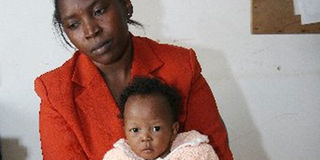Wilting in bloom: rickets cases worry medics in Naivasha

Photo/JENNIFER MUIRURI
Esther Muthoni holds her daughter Patience Njoki at the Naivasha district hospital on February 13, 2012.
What you need to know:
- Disease prevalence attributed to poor feeding of children, especially those whose mothers work on flower farms
When Margaret Wanjiku gave birth to her son in 2010, it marked an expected moment of delight for this first-time mother.
Over the months as Joshua suckled and Wanjiku admired her bundle of joy from what had been a difficult pregnancy.
At six months she noticed that Joshua’s tiny legs could hardly firm up on her lap.
“He had tiny legs which seemed to form a bow whenever we tried to have him stand,” she said.
He was diagnosed with rickets, a disease considered by some to be as ancient as polio.
Joshua is almost two years old now and is on treatment for the disease whose rate of occurrence among children aged six months to two years is alarming.
At the Naivasha district hospital, Joshua is not the only child struggling with this disease.
“We have seen 184 cases of rickets in the last one year,” said Medical superintendent Dr Joseph Mburu. This translates to an average of 15 new cases per month, which is above the normal prevalence of rickets in the country.
Dr Mburu attributes the disease to poor feeding habits, neglect of children at an early age and lack of exposure to sunshine.
Rickets was referred to as the soft-bone scourge of the 19th century. But it is here and the number of cases reported is increasing.
Esther Muthoni’s seven-month old daughter Patience is also undergoing treatment in Naivasha. Ms Muthoni says she met all the dietary requirements during pregnancy.
She attributes the prevalence of rickets to the water or food in Naivasha.
Kenyatta University nutrition lecturer Dr George Omolo Rombo agrees. He says the high fluoride content of most natural water sources in the town is to blame for the prevalence of the disease.
“Naivasha town is right in the middle of Rift Valley, where high fluoride contents have been reported before in rivers, boreholes, soil and even dust of the air,” Dr Rombo says in an academic paper.
Intake of high amounts of fluoride in food or water may hinder normal deposition of calcium in the bones.
And there is another twist. About 80 per cent of children with rickets in Naivasha are from the flower-growing areas.
“The women working in these farms are paid poorly and can hardly buy calcium-rich foods necessary for the unborn child,” said Mr Mwangi Mahinda, an occupational therapist.
And when the children are born, they are weaned early because their mothers have to resume work at the farms. They leave them at day care centres with women who are largely untrained or ill equipped to take care of children’s nutritional needs.
The situation appears grim. According to a draft report titled Wilting in Bloom: The Irony of Women’s Labour Rights in the Cutflower Sector in Kenya, 82 per cent of employees reported high rates of unfair dismissal.
It was conducted among 15 flower companies in Naivasha, Thika, and Athi River by the Kenya Human Rights Commission. The commission’s senior programme officer Tom Kagwe says there is little to celebrate for women who work on flower farms.
“There has been a gradual decrease of employment of women as a result of the longer maternity leave in the new laws,” Mr Kagwe said. “Worse still, women are perpetually screened for pregnancy, which is contrary to the Constitution.”
Kenya Flower Council chief executive Jane Ngige said some flower farms maintain day care centres.
“There are no laws that require flower farms to establish day care centres, but those that do have managed them well,” Ms Ngige told the Sunday Nation.
She said starting next month when new regulations governing social and environmental ethics are introduced, things will change for the better, and the days are numbered for “bad” companies.
“The flower industry has for a long time operated without mechanisms to check malpractices. The new regulations seek to ensure that all exporters get a certificate of compliance to set social and environmental ethics, without which they will not ship produce out of the country,” she said.
And there is hope for young patients. Mr Mahinda says, if children suffering from rickets undergo frequent therapy sessions in addition to the medication provided, they will strengthen the affected muscles.




